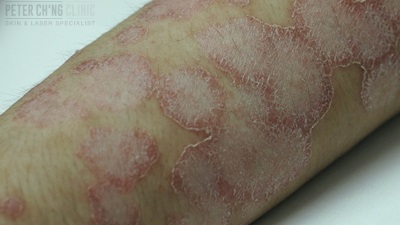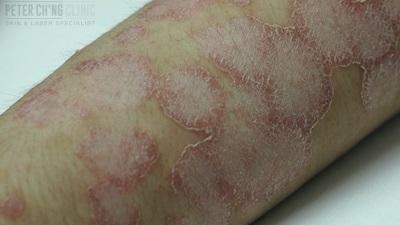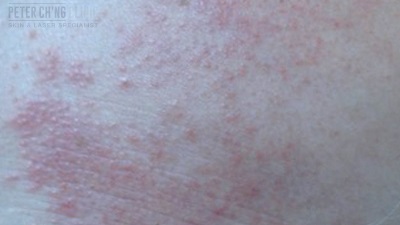Treatment for Psoriasis

New Hope for People with Psoriasis
People with psoriasis know that this condition is no mere skin disease. Their skin forms red patches with thick, silvery scales, and these plaques are accompanied by itch, irritation and even joint pain. The joint pain may prevent the person from working or going to school, and the negative reaction of others to their appearance can hurt their self-esteem.
Psoriasis is actually an auto-immune disease, caused by the immune system attacking healthy skin cells under the assumption that these skin cells are the ‘enemies’.
Consultant dermatologist Dr Peter Ch'ng explains that, in addition to the symptoms described above, about 30% of patients with psoriasis may develop psoriatic arthritis. Just like rheumatoid arthritis, psoriatic arthritis causes inflammation of the joints, making movement difficult and even painful. Sometimes, the affected joints may become permanently deformed.
Treating psoriasis can be challenging
“ The most challenging part of treating patients with psoriasis, ” says Dr Peter Ch'ng , “ is how some patients, especially those with severe psoriasis, may not respond adequately to treatment. There are also patients who cannot tolerate the current conventional therapy due to side effects, or they suffer from health conditions that make these available treatments unsuitable or even dangerous for them(contraindication).”
Therefore, there are always people living with psoriasis who find that current available treatments still cannot help them achieve symptom-free outcomes.
A new option for clear skin
More treatment options are always better when it comes to psoriasis, and the dream of having clear skin is more achievable that ever, thanks to the introduction of secukinumab in Malaysia this year.
Secukinumab is the bioengineered version of an antibody that binds specifically to a protein in the body called IL-17A. IL-17A is thought to play a role in the development of symptoms in both psoriasis and psoriatic arthritis. Sekukinumab stops the activity of IL-17A, thus helping to reduce the symptoms as well as inflammation to a very effective degree.
Dr Peter Ch’ng explains, “ Secukinumab has demonstrated superior efficacy outcome compared to current treatment.” He elaborates that eights out of 10 patients are able to achieve clear or almost clear skin after receiving this treatment. Furhermore, more than 80% of patients with psoriatic arthritis found that secukinumab managed to stop the progression of their joint damage.
But is the drug safe? Dr Ch’ng says, “This drug was studied in clinical trials involving more than 4,000 patients, and the safety profile was found to be similar to other biologic treatments in the market.
He also says that the most common side effects are upper respiratory tract infections, with symptoms such as sore throat and stuffy nose (nasopharyngitis,rhinitis). However, patients should not worry : if their physician deems that they are suitable to receive secukinumab, there would be a thorough discussion on the safety and precautions before treatment is initiated.
5 Things about Psoriasis
- Psoriasis is not simply a skin disease. It is an auto-immune disease, which arises when something goes wrong with the immune system. People with this condition have raised red, scaly patches (or plaques) on their skin.
- About 1-3% of Malaysians are affected, and psoriasis can affect both adults and children of both sexes.
- About 30% of people with psoriasis will develop psoriatic arthritis, a condition that can cause joint pain, stiffness and swelling. Movement becomes difficult and often painful, and joint deformities may arise.
- There are long-term affects on the health. In addition to psoriatic arthritis, untreated psoriasis is also linked to increased risk of diabetes, obesity, cardiovascular disease and stroke. Young people with psoriasis, especially more severe psoriasis, are at higher risk of having reduced life span.
- One cannot catch psoriasis from other people. Thus,if psoriasis affects you or your loved one, it is important to get proper medical attention and treatment as early as possible.
The Burning Itch
Up to 90% of people with psoriasis can experience itch as a constant frustration in their lives. This itch is a burning and sometimes painful sensation, comparable to bites of fire ants.
Itch can be triggered by stress, so yoga, medication and other relaxation therapies can be useful. Regular exercise and counseling can also help.
Blow to Self-Esteem
Psoriasis can affect a person ability to socialize, form romantic relationships and find employment. This leaves him or her vulnerable to depression and destructive behaviour such as drug abuse and alcoholism.
A published review in the American Journal of Clinical Dermatology suggested that “social stigmatization, high stress levels, physical limitations, depression, employment problems and other psychosocial co-morbidities experienced by patients with psoriasis are not always proportional to, or predicted by, other measurements of disease severity such as body surface area involvement or plaque severity. Thus, the severity of psoriasis will not be made based only on physical examination. The dermatologist will also evaluate the impact of the condition on your quality of life.
Treatment for Clearer Skin
There are a number of treatment options available for psoriasis. It is not unusual for the dermatologist to change to a different treatment if a patient is not responding adequately to his or her current treatment.
Topical treatments
These are the creams, ointments and lotions that can be applied onto the affected areas of the skin.
Those containing peeling agents such as salicylic acid help to soften psoriasis scales, making them easier to remove.
Moisturizers are important to prevent dry skin, which tends to be itchy and may worsen psoriasis.
Light therapy (phototherapy)
Ultraviolet light B (UVB) is targeted at affected areas to slow the growth of skin at the affected areas. This is an effective treatment, but the patient needs to receive it consistently for best results.
Medication
Methotrexate is a commonly prescribed medication : it has been found to be effective for many patients and the number of patients and the number of patients that experience side effects is relatively small. It is also a cost-effective medication. However, it may cause side effects such as liver problems, so it may not be an option for some patients. Aside from methotrexate, cyclosporine and retinoids are also some examples of more conventional medications.
Recently, another type of medication, called biologics, has been developed. Biologics are bioengineered medications that target specific pathways in the immune system. Because psoriasis is a condition caused by abnormal workings in the immune system, biologics can be more effective, accurate form of treatment. Some examples are etanercept, infliximab, adalimumab and ustekinumab. Biologics are usually injected into the skin or administered intravenously (through a drip).
New medication offers better hope for clear skin
Secukinumab is a biologic that binds specifically to a protein in the body called interleukin-17A (IL-17A), stopping its activity and reducing symptoms very effectively.
- 8 out of 10 patients achieved clear or almost clear skin with 90% skin clearance (PASI 90).
- 83% of patients were able to maintain 75% skin clearance (PASI 75) for up to three years.
- Clinical trials on more than 4,000 patients found that its safety profile is similar to other biologics in the market.
To enquire more about Treatment for Psoriasis, contact us or book an appointment here!
This treatment can treat the following conditions:

Psoriasis
In a normal skin, superficial skin is being shed off as fast as the new ones are forming. In psoriasis, the new cells grow too fast and that is why the skin is thick and scaly. Psoriasis is a skin condition whereby the immune system sends wrong signals to the cells to grow. Some patients may have family history of psoriasis.
Related treatments and services:

Treatment for Eczema
Atopic eczema or atopic dermatitis is the commonest skin condition in children. Almost 1 in 5 of the children in Malaysia are suffering from atopic eczema.
